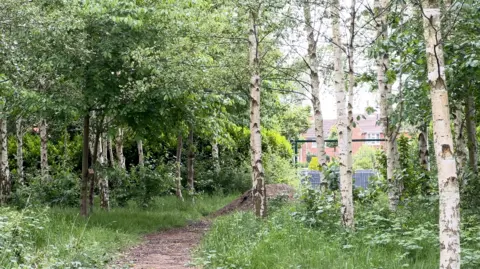'Foxes using school playground as a toilet'
 BBC
BBCA primary school says it is exploring ways to humanely remove foxes from the grounds due to safety concerns.
Fran Rhodes, the principal at Hartsholme Academy in Lincoln, said foxes had been encroaching on the site for 12 years and had used playing fields and other areas "as a toilet".
"The priority is the safety of our children, we've done a risk assessment and the amount of diseases that's carried in the fox faeces is a concern for us," she said.
The RSPCA said there were "some risks" associated with fox faeces, but deterrent measures might be more effective than removing the animals, as others might take their place.
Ms Rhodes said the school was "reviewing the situation" and would contact animal specialists for advice.
Her top priority was the children's health and safety, especially as the school cared for young children from the age of three.

She recalled an incident in 2024 when an adult fox entered the school field and a site manager attempted to usher it away.
"But it ran the opposite way and over the nursey gate," Ms Rhodes said. "Thankfully the children had just gone in.
"Those are the situations that really concern me, which is why I felt like we needed to do something to sort this out."
According to Ms Rhodes, the school's site manager is called out every day to collect fox faeces.
"We have fox poo and urine everywhere, it does become a bit of an issue."
'Humane' approach
Messages seen by the BBC in a community social media group with more than 50,000 members raised questions about the welfare of the foxes, including the use of traps on school grounds.
Ms Rhodes said she "understood" the concerns. Traps had been used previously, but she wanted to assure people that they were "humane".
The school was now seeking specialist advice from animal experts.
Graham Le Blond, 65, who runs a non-lethal fox control business, Fox-A-Gon, said schools could be an "attraction for a fox" and outside learning areas often appealed to them.
"They contain decking or sheds, which is what the vast majority of foxes now live underneath," he said. "They're ideal locations."

Mr Le Blond said the animals were "creatures of habit" and removing them involved "changing their pattern".
Rebecca Machin, a scientific and policy officer at the RSPCA, said there were "some risks" associated with fox faeces, which "can contain toxoplasmosis or round worm".
However, she warned that if the school removed the foxes, it was "likely" that others would take their place.
"We would say the best thing is to try deterrent measures, these are more likely to succeed in the long term," she added.
Ms Machin recommend removing any sources of food and ensuring fencing was secure.
According to the NHS, toxocariasis is an infection caused by small worms found in faeces.
Although rare, it can cause "serious problems like difficulty breathing or loss of vision", the NHS website states.
Listen to highlights from Lincolnshire on BBC Sounds, watch the latest episode of Look North or tell us about a story you think we should be covering here.
